

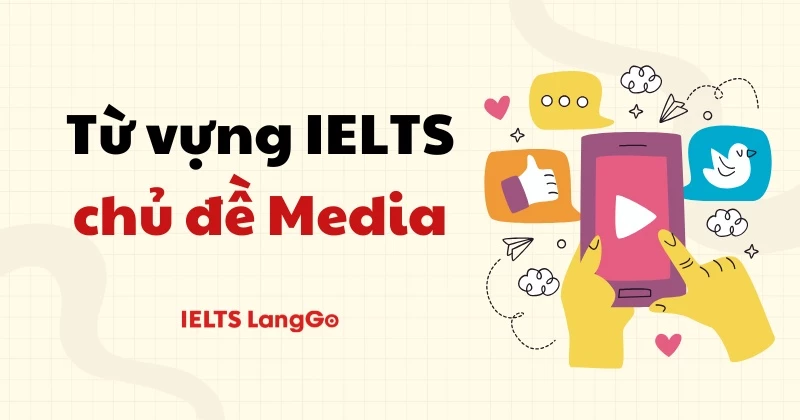
Chủ đề Media là một trong các chủ đề thường xuyên xuất hiện trong bài thi IELTS thời gian gần đây. Trong bài viết ngày hôm nay, IELTS LangGo sẽ chia sẻ đến bạn bộ từ vựng IELTS chủ đề Media và một số câu hỏi phổ biến ở phần thi IELTS Speaking chủ đề thú vị này. Hãy cùng tìm hiểu nhé!
Ví dụ: The New York Times is a well-respected broadsheet known for its in-depth reporting. (The New York Times là một ấn phẩm khổ rộng được kính trọng vì phóng sự chuyên sâu của nó.)
Ví dụ: CNN is a major media outlet that broadcasts news worldwide. (CNN là một ấn phẩm truyền thông lớn phát sóng tin tức trên toàn thế giới.)
Ví dụ: The tabloid published sensational stories about the celebrity's private life. (Tờ báo khổ nhỏ đã xuất bản những câu chuyện giật gân về đời tư của người nổi tiếng.)
Ví dụ: Time Magazine is a weekly publication covering national and international news. (Tạp chí Time là một ấn phẩm hàng tuần đưa tin về tin tức quốc gia và quốc tế.)
Ví dụ: The local business journal is a biweekly that provides market updates. (Tạp chí kinh doanh địa phương là một ấn phẩm hai lần một tuần cung cấp cập nhật thị trường.)
Ví dụ: The church bulletin contained announcements about upcoming events. (Tập san nhà thờ chứa các thông báo về các sự kiện sắp tới.)
Ví dụ: The compact format makes the newspaper easy to read on the subway. (Định dạng nhỏ gọn làm cho tờ báo dễ đọc trên tàu điện ngầm.)
Ví dụ: She distributes her Star Trek fanzine at sci-fi conventions. (Cô ấy phân phối tạp chí người hâm mộ Star Trek tại các hội nghị khoa học viễn tưởng.)
Ví dụ: The Financial Times is considered a heavy with its focus on economic analysis. (Financial Times được coi là một tờ báo chính luận với trọng tâm là phân tích kinh tế.)
Ví dụ: More people now get their information from online news than printed newspapers. (Nhiều người hiện nay nhận thông tin từ báo điện tử hơn là báo in.)
Ví dụ: He never starts his morning without reading the daily. (Anh ấy không bao giờ bắt đầu buổi sáng mà không đọc nhật báo.)
Sau đây là các từ vựng về nội dung trong bài báo mà bạn có thể tham khảo:
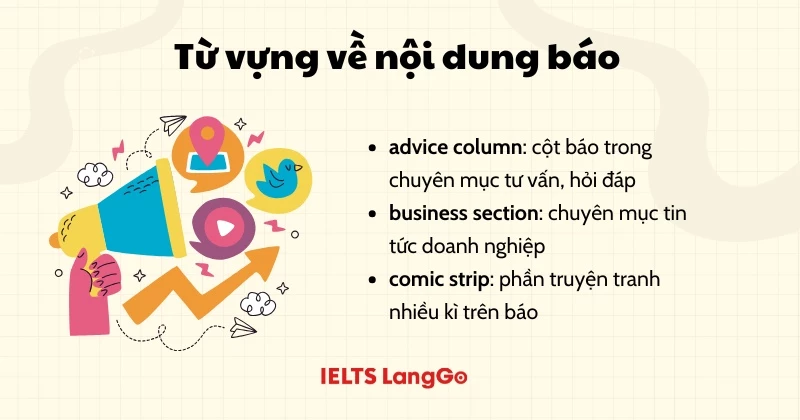
Ví dụ: She wrote to the advice column seeking help with her relationship problems. (Cô ấy đã viết thư cho cột báo tư vấn để tìm kiếm sự giúp đỡ về các vấn đề trong mối quan hệ của mình.)
Ví dụ: Investors check the business section daily to track market trends. (Các nhà đầu tư kiểm tra chuyên mục tin tức doanh nghiệp hàng ngày để theo dõi xu hướng thị trường.)
Ví dụ: The caption under the photograph identified all the people in the award ceremony. (Phần chú thích dưới bức ảnh đã xác định tất cả những người trong buổi lễ trao giải.)
Ví dụ: Most newspapers format their text in columns to make reading easier. (Hầu hết các tờ báo định dạng văn bản của họ thành các cột để việc đọc dễ dàng hơn.)
Ví dụ: Many readers turn to the comic strip first for a morning laugh. (Nhiều độc giả chuyển sang phần truyện tranh trước tiên để có tiếng cười buổi sáng.)
Ví dụ: The newspaper's editorial criticized the new government policy. (Bài xã luận của tờ báo đã chỉ trích chính sách mới của chính phủ.)
Ví dụ: Bold headlines announced the election results across every newspaper. (Những tiêu đề in đậm đã thông báo kết quả bầu cử trên mọi tờ báo.)
Ví dụ: She always reads her horoscope even though she doesn't really believe in astrology. (Cô ấy luôn đọc chuyên mục cung hoàng đạo của mình mặc dù cô ấy không thực sự tin vào chiêm tinh học.)
Ví dụ: The international news section covered the summit between world leaders. (Chuyên mục tin quốc tế đã đưa tin về hội nghị thượng đỉnh giữa các nhà lãnh đạo thế giới.)
Ví dụ: He wrote a letter to the editor expressing his concerns about local pollution. (Ông ấy đã viết thư gửi đến ban biên tập bày tỏ quan ngại về ô nhiễm địa phương.)
Ví dụ: The obituary celebrated the life of the beloved community leader. (Cáo phó đã tôn vinh cuộc đời của nhà lãnh đạo cộng đồng được yêu mến.)
Ví dụ: The Sunday edition included a special feature about climate change. (Ấn bản Chủ nhật có một tin đặc biệt về biến đổi khí hậu.)
Ví dụ: Farmers rely heavily on the weather report to plan their activities. (Nông dân phụ thuộc nhiều vào mục dự báo thời tiết để lên kế hoạch cho các hoạt động của họ.)
Ví dụ: The newspaper published an in-depth analysis of how the new tax policy would affect different income groups. (Tờ báo đã xuất bản một bài phân tích chuyên sâu về cách chính sách thuế mới sẽ ảnh hưởng đến các nhóm thu nhập khác nhau.)
Ví dụ: The station interrupted regular programming to report breaking news about the earthquake. (Đài đã ngắt chương trình thường lệ để đưa tin nóng về trận động đất.)
Ví dụ: The merger between the two tech giants dominated business news this week. (Vụ sáp nhập giữa hai gã khổng lồ công nghệ đã chiếm lĩnh tin tức doanh nghiệp tuần này.)
Ví dụ: The debate show focuses on current affairs that impact national politics. (Chương trình tranh luận tập trung vào các vấn đề hiện thời ảnh hưởng đến chính trị quốc gia.)
Ví dụ: Celebrity gossip filled the back pages of the entertainment magazine. (Tin tầm phào về người nổi tiếng đã lấp đầy các trang cuối của tạp chí giải trí.)
Ví dụ: International news reported tensions rising between the two neighboring countries. (Tin thế giới đưa tin về căng thẳng gia tăng giữa hai quốc gia láng giềng.)
Ví dụ: The politician sued the newspaper for libel after they published false accusations. (Chính trị gia đã kiện tờ báo vì tội phỉ báng sau khi họ xuất bản những cáo buộc sai sự thật.)
Ví dụ: Local news covered the opening of the new community center in detail. (Tin địa phương đã đưa tin chi tiết về việc khai trương trung tâm cộng đồng mới.)
Ví dụ: The unknown athlete made the headlines after winning the gold medal unexpectedly. (Vận động viên vô danh đã bỗng nhiên xuất hiện trên bản tin sau khi bất ngờ giành huy chương vàng.)
Ví dụ: The summit received extensive news coverage from media outlets worldwide. (Hội nghị thượng đỉnh đã nhận được tin tức trang nhất rộng rãi từ các cơ quan truyền thông trên toàn thế giới.)
Ví dụ: The journalist is known for objective reporting even on controversial topics. (Nhà báo này nổi tiếng với việc đưa tin một cách khách quan ngay cả về các chủ đề gây tranh cãi.)
Ví dụ: The tabloid specializes in sensational news that exaggerates minor events. (Tờ báo lá cải chuyên về tin giật gân thường phóng đại các sự kiện nhỏ.)
Ví dụ: The political scandal received wide coverage in the press for weeks. (Vụ bê bối chính trị đã xuất hiện trên trang nhất của nhiều báo trong nhiều tuần.)
Ví dụ: The story about the rescue dog went viral on social media within hours. (Câu chuyện về chú chó được cứu hộ đã được lan truyền rộng rãi trên mạng xã hội trong vòng vài giờ.)
Ví dụ: The news program provides daily updates on major world events. (Chương trình tin tức cung cấp cập nhật hàng ngày về các sự kiện quốc tế quan trọng.)
Ví dụ: I usually catch a news bulletin on the radio during my morning commute. (Tôi thường đọc bản tin trên đài phát thanh trong quá trình đi làm buổi sáng.)
Ví dụ: Many people around the world are following a story about the rescue mission in the mountains. (Nhiều người trên thế giới đang theo dõi một câu chuyện về nhiệm vụ cứu hộ trên núi.)
Ví dụ: She took her time to peruse her favourite column about gardening tips. (Cô ấy dành thời gian để nghiên cứu kỹ bài báo yêu thích của mình về các mẹo làm vườn.)
Ví dụ: I decided to subscribe to a publication about photography to improve my skills. (Tôi quyết định đăng ký theo dõi một ấn phẩm về nhiếp ảnh để cải thiện kỹ năng của mình.)
Ví dụ: Investors track the news about market trends to make informed decisions. (Các nhà đầu tư theo dòng tin tức về xu hướng thị trường để đưa ra quyết định sáng suốt.)
Cùng tìm hiểu từ vựng về những người liên quan đến báo chí trong chủ đề media nhé:
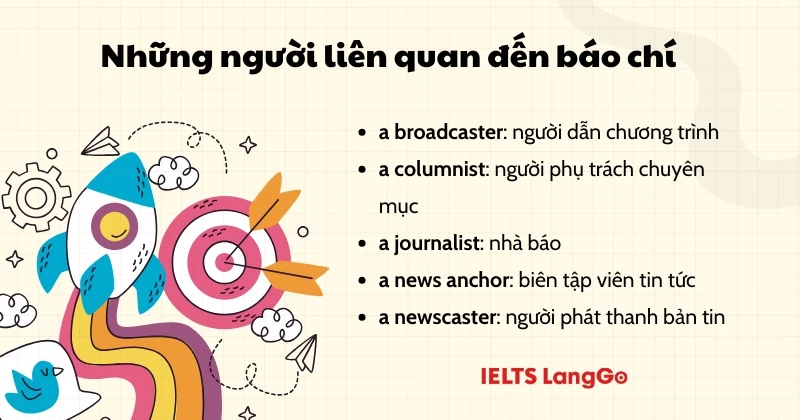
Ví dụ: The broadcaster's deep, calming voice has been waking up the city every morning for twenty years. (Giọng nói trầm ấm, dịu dàng của người dẫn chương trình đã đánh thức thành phố mỗi sáng trong suốt hai mươi năm qua.)
Ví dụ: The popular columnist writes about financial advice every Thursday in the newspaper. (Người phụ trách chuyên mục nổi tiếng viết về lời khuyên tài chính vào mỗi thứ Năm trên tờ báo.)
Ví dụ: The experienced journalist traveled to conflict zones to report on humanitarian crises. (Nhà báo giàu kinh nghiệm đã đi đến các vùng xung đột để đưa tin về các cuộc khủng hoảng nhân đạo.)
Ví dụ: The experienced journalist traveled to conflict zones to report on humanitarian crises. (Nhà báo giàu kinh nghiệm đã đi đến các vùng xung đột để đưa tin về các cuộc khủng hoảng nhân đạo.)
Ví dụ: The newscaster announced the election results with professional neutrality. (Người phát thanh bản tin đã công bố kết quả bầu cử với sự trung lập chuyên nghiệp.)
Ví dụ: The photojournalist's powerful images of the refugee crisis won several awards. (Những hình ảnh mạnh mẽ về cuộc khủng hoảng người tị nạn của phóng viên nhiếp ảnh đã giành được nhiều giải thưởng.)
Ví dụ: The reporter interviewed witnesses at the scene of the accident. (Phóng viên đã phỏng vấn nhân chứng tại hiện trường vụ tai nạn.)
Ví dụ: The celebrity couple was surrounded by paparazzi as they left the restaurant. (Cặp đôi nổi tiếng đã bị bao vây bởi những người săn ảnh khi họ rời khỏi nhà hàng.)
Ví dụ: The politician accused unscrupulous reporters of fabricating quotes in their stories. (Chính trị gia đã buộc tội những tay báo vô đạo đức bịa đặt các trích dẫn trong bài viết của họ.)
Ví dụ: It must have been a slow news day when the local cat show made the front page. (Chắc hẳn đó là một ngày không có nhiều tin tức khi cuộc triển lãm mèo địa phương xuất hiện trên trang nhất.)
Ví dụ: Many people experience information overload when trying to follow too many news sources simultaneously. (Nhiều người trải qua tình trạng bội thực thông tin khi cố gắng theo dõi quá nhiều nguồn tin cùng một lúc.)
Ví dụ: The celebrity sued the magazine for invasion of privacy after they published photos of her children at school. (Người nổi tiếng đã kiện tạp chí vì xâm phạm đời tư sau khi họ đăng ảnh con cô ấy ở trường.)
Ví dụ: The actor refused to respond to allegations published in the gutter press about his personal relationships. (Nam diễn viên từ chối phản hồi những cáo buộc được đăng trên loại báo giật gân về các mối quan hệ cá nhân của anh.)
Ví dụ: The newspaper was criticized for yellow journalism when it published unverified rumors about the government official. (Tờ báo đã bị chỉ trích vì loại hình báo chí vàng khi đăng tải những tin đồn chưa được xác minh về viên chức chính phủ.)
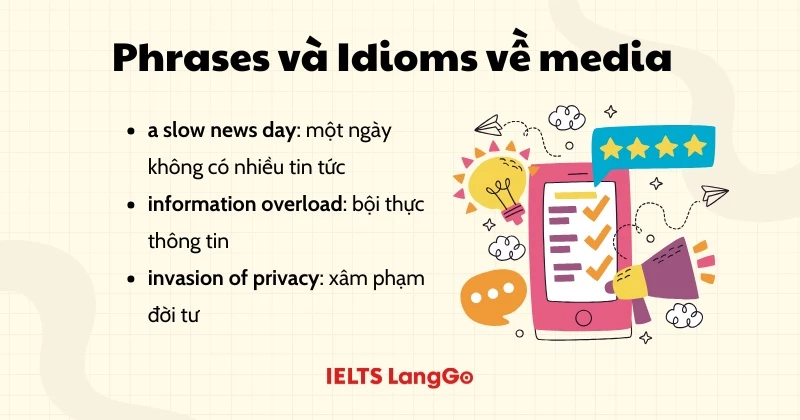
Ví dụ: The newspaper used an attention-grabbing headline about the local scandal. (Tờ báo đã sử dụng một tiêu đề thu hút sự chú ý về vụ bê bối địa phương.)
Ví dụ: The newspaper has a daily circulation of over 100,000 copies. (Tờ báo có số ấn bản hàng ngày hơn 100.000 bản.)
Ví dụ: The magazine cover featured an eye-catching design with bright colors. (Bìa tạp chí có thiết kế bắt mắt với màu sắc tươi sáng.)
Ví dụ: The newspaper hired three additional fact checkers before publishing the investigative report. (Tờ báo đã thuê thêm ba người kiểm chứng thông tin trước khi xuất bản bài báo điều tra.)
Ví dụ: The election results dominated the front page of every newspaper in the country. (Kết quả bầu cử chiếm lĩnh trang nhất của mọi tờ báo trong cả nước.)
Ví dụ: This information is hot off the press - the announcement was made just minutes ago. (Thông tin này vừa mới phát hành - thông báo được đưa ra chỉ vài phút trước.)
Ví dụ: The journalist wrote an in-depth analysis of the economic crisis. (Nhà báo đã viết một bài phân tích chi tiết về cuộc khủng hoảng kinh tế.)
Ví dụ: The editor approved the final layout of tomorrow's newspaper. (Biên tập viên đã phê duyệt thiết kế dàn trang cuối cùng của tờ báo ngày mai.)
Ví dụ: Climate change was the main issue discussed during the debate. (Biến đổi khí hậu là vấn đề chính được thảo luận trong cuộc tranh luận.)
Ví dụ: The newspaper has a loyal readership of mostly urban professionals. (Tờ báo có đội ngũ độc giả trung thành chủ yếu là các chuyên gia thành thị.)
Ví dụ: The media in North Korea broadcast propaganda every day about the dangers of war with South Korea and the USA.
Ví dụ: Newspapers in my country often have a leading article on some sensational crime that has been committed.
Ví dụ: The editorial policy of a newspaper determines whether serious news items are reported in a responsible way.
Ví dụ: Unfortunately, sensational journalism has resulted in much public distrust of the media.
Ví dụ: The media nowadays carries too many stories about celebrities and trivia and not enough serious news.
Ví dụ: The US presidential election received global news coverage, so that the whole world became interested in the outcome.
Ví dụ: The controversial decision by the Supreme Court made front page headlines across the country. (Quyết định gây tranh cãi của Tòa án Tối cao đã trở thành tin tức quan trọng trên trang nhất báo trên khắp đất nước.)
Ví dụ: Journalists rushed to the scene to report the breaking news of the earthquake. (Các nhà báo vội vàng đến hiện trường để đưa tin nóng về trận động đất.)
Ví dụ: For travelers, having up to the minute information about flight delays is essential. (Đối với khách du lịch, việc có thông tin cập nhật từng phút về sự chậm trễ của chuyến bay là điều cần thiết.)
Ví dụ: By the time the newspaper was published, the announcement was already stale news on social media. (Đến lúc tờ báo được xuất bản, thông báo đã trở thành thông tin cũ trên mạng xã hội rồi.)
Ví dụ: Many print newspapers are facing falling circulation as readers shift to online news sources. (Nhiều tờ báo in đang đối mặt với sự giảm sút số lượng các bản báo được bán khi độc giả chuyển sang nguồn tin trực tuyến.)
Ví dụ: Many young consumers are influenced by celebrity endorsements on social media platforms. (Nhiều người tiêu dùng trẻ bị ảnh hưởng bởi sự tham gia của người nổi tiếng trên các nền tảng mạng xã hội.)
Ví dụ: He decided to subscribe to a magazine about photography to improve his skills. (Anh ấy quyết định mua tạp chí dài hạn về nhiếp ảnh để cải thiện kỹ năng của mình.)
Ví dụ: Investors start their day by reading the financial sections of major newspapers. (Các nhà đầu tư bắt đầu ngày mới bằng việc đọc các mục tài chính của các tờ báo lớn.)
Ví dụ: Online advertising allows small businesses to compete with larger competitors at a fraction of the cost. (Quảng cáo trực tuyến cho phép các doanh nghiệp nhỏ cạnh tranh với các đối thủ lớn hơn với chi phí thấp hơn nhiều.)
Ví dụ: The department store slashed the prices of its winter collection to make room for spring items. (Cửa hàng bách hóa đã giảm giá sốc bộ sưu tập mùa đông để nhường chỗ cho các mặt hàng mùa xuân.)
Ví dụ: Consumers should be wary of advertisements that promise miraculous results without scientific evidence. (Người tiêu dùng nên thận trọng với những quảng cáo hứa hẹn kết quả kỳ diệu mà không có bằng chứng khoa học.)
Ví dụ: Companies spend millions each year to promote their products through various marketing channels. (Các công ty chi hàng triệu đô la mỗi năm để xúc tiến sản phẩm của họ thông qua các kênh tiếp thị khác nhau.)
Ví dụ: Sale events often encourage shoppers to buy goods impulsively without considering if they really need the items. (Các sự kiện giảm giá thường khuyến khích người mua hàng mua sắm một cách bốc đồng mà không cân nhắc liệu họ có thực sự cần những món đồ đó không.)
Ví dụ: Children are often easily swayed by advertisements featuring their favorite cartoon characters. (Trẻ em thường dễ dàng bị dao động bởi quảng cáo có các nhân vật hoạt hình yêu thích của chúng.)
Ví dụ: The company used surveys to conduct market research before designing their new product. (Công ty đã sử dụng khảo sát để tiến hành nghiên cứu thị trường trước khi thiết kế sản phẩm mới của họ.)
Ví dụ: The two gas stations engaged in a price war, lowering fuel costs daily. (Hai trạm xăng đã tham gia vào một cuộc chiến tranh giá cả, hạ giá nhiên liệu hàng ngày.)
Ví dụ: Apple will launch a product at their annual conference next week. (Apple sẽ giới thiệu một sản phẩm mới tại hội nghị thường niên của họ vào tuần tới.)
Ví dụ: The luxury watch brand's target audience is high-income professionals. (Khách hàng mục tiêu của thương hiệu đồng hồ xa xỉ là các chuyên gia có thu nhập cao.)
Ví dụ: The viral marketing campaign significantly increased brand awareness. (Chiến dịch tiếp thị viral đã làm tăng đáng kể sự nhận thức về thương hiệu.)
Ví dụ: The company paid extra to advertise during prime time television. (Công ty đã trả thêm tiền để quảng cáo trong giờ vàng phát sóng.)
Ví dụ: News spreads faster through electronic media than print. (Tin tức lan truyền nhanh hơn qua phương tiện truyền thông điện tử so với báo in.)
Ví dụ: The agency will impose regulations on tobacco advertising. (Cơ quan này sẽ áp đặt các quy định về quảng cáo thuốc lá.)
Ví dụ: The agency will impose regulations on tobacco advertising. (Cơ quan này sẽ áp đặt các quy định về quảng cáo thuốc lá.)
Ví dụ: Many consumers hang up when they receive telemarketing calls. (Nhiều người tiêu dùng cúp máy khi họ nhận được các cuộc gọi tiếp thị qua điện thoại.)
Q. Which magazines and newspapers do you read? [Why?]
Q. What kinds of article are you most interested in? [Why?]
Q. Have you ever read a newspaper or magazine in a foreign language? [When/Why?]
Q. Do you think reading a newspaper or magazine in a foreign language is a good way to learn the language? [Why/Why not?]
Describe an article that you read from a magazine or from the Internet about healthy lifestyle
You should say:
Trên đây là các từ vựng IELTS chủ đề media thường gặp nhất và các ví dụ minh hoọa giúp bạn dễ dàng áp dụng trong bài thi. Hãy luyện tập sử dụng các từ vựng này trong chủ đề media để nâng cao điểm số của mình bạn nhé. Chúc bạn ôn luyện hiệu quả!


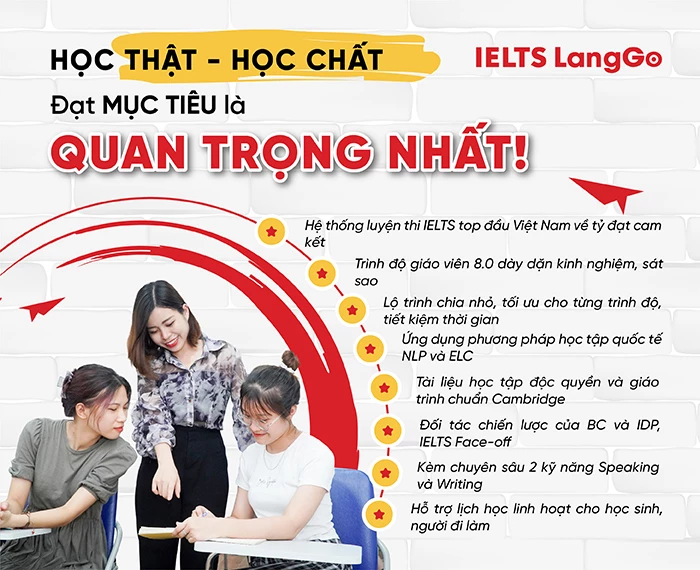
ĐẶT LỊCH TƯ VẤN MIỄN PHÍ LỘ TRÌNH Săn ƯU ĐÃI lên tới 12.000.000đ